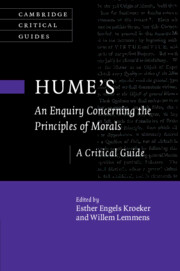Book contents
- Hume’s An Enquiry Concerning the Principles of Morals
- Cambridge Critical Guides
- Hume’s An Enquiry Concerning the Principles of Morals
- Copyright page
- Contents
- Contributors
- Acknowledgments
- Abbreviations
- Introduction
- Chapter 1 The Nature of Morals Founded on the Human Fabric
- Chapter 2 The Pride of Pericles
- Chapter 3 Justice and Politics in the Enquiry Concerning the Principles of Morals
- Chapter 4 History, Context, and the Conventions of Political Society
- Chapter 5 “Why Utility Pleases”
- Chapter 6 Hume on Talents and Moral Virtues
- Chapter 7 Virtues Suspect and Sublime
- Chapter 8 Sympathy and the Sources of Moral Sentiment
- Chapter 9 Virtue and Moral Psychology in the Enquiry Concerning the Principles of Morals
- Chapter 10 Hume, Cicero, and the Ancients
- Chapter 11 Hume on Religion in the Enquiry Concerning the Principles of Morals
- Chapter 12 Moral Disagreement
- Bibliography
- Index
- Cambridge Critical Guides
Chapter 1 - The Nature of Morals Founded on the Human Fabric
Published online by Cambridge University Press: 08 January 2021
- Hume’s An Enquiry Concerning the Principles of Morals
- Cambridge Critical Guides
- Hume’s An Enquiry Concerning the Principles of Morals
- Copyright page
- Contents
- Contributors
- Acknowledgments
- Abbreviations
- Introduction
- Chapter 1 The Nature of Morals Founded on the Human Fabric
- Chapter 2 The Pride of Pericles
- Chapter 3 Justice and Politics in the Enquiry Concerning the Principles of Morals
- Chapter 4 History, Context, and the Conventions of Political Society
- Chapter 5 “Why Utility Pleases”
- Chapter 6 Hume on Talents and Moral Virtues
- Chapter 7 Virtues Suspect and Sublime
- Chapter 8 Sympathy and the Sources of Moral Sentiment
- Chapter 9 Virtue and Moral Psychology in the Enquiry Concerning the Principles of Morals
- Chapter 10 Hume, Cicero, and the Ancients
- Chapter 11 Hume on Religion in the Enquiry Concerning the Principles of Morals
- Chapter 12 Moral Disagreement
- Bibliography
- Index
- Cambridge Critical Guides
Summary
In Section 1 of An Enquiry Concerning the Principles of Morals, Hume claims that those who deny the reality of morals are disingenuous. He notes that philosophy has had a history of disagreements about whether morals originate in reason or sentiment. Throughout his book, Hume applies an experimental method to find the “universal principles” from which morality is derived. Then, in Appendix 1, he argues for the origin of these principles in sentiment or taste, a product of “the human fabric.” Reason, Hume says, discovers objects “as they really stand in nature, without addition or diminution.” Taste “has a productive faculty, and gilding or staining all natural objects with the colours, borrowed from internal sentiment, raises, in a manner, a new creation.” How can the quest for universal principles find a satisfactory answer in taste, a “productive” faculty? How is the notion that morality is a “new creation” consistent with an insistence on the reality of moral distinctions? Are the deliverances of taste, which are prompts to virtue, also judgments that can be evaluated as true or false? This essay shows that, on a proper reading, the elements of Hume’s moral epistemology in the second Enquiry are largely consistent.
- Type
- Chapter
- Information
- Hume's An Enquiry Concerning the Principles of MoralsA Critical Guide, pp. 13 - 32Publisher: Cambridge University PressPrint publication year: 2021
- 1
- Cited by



